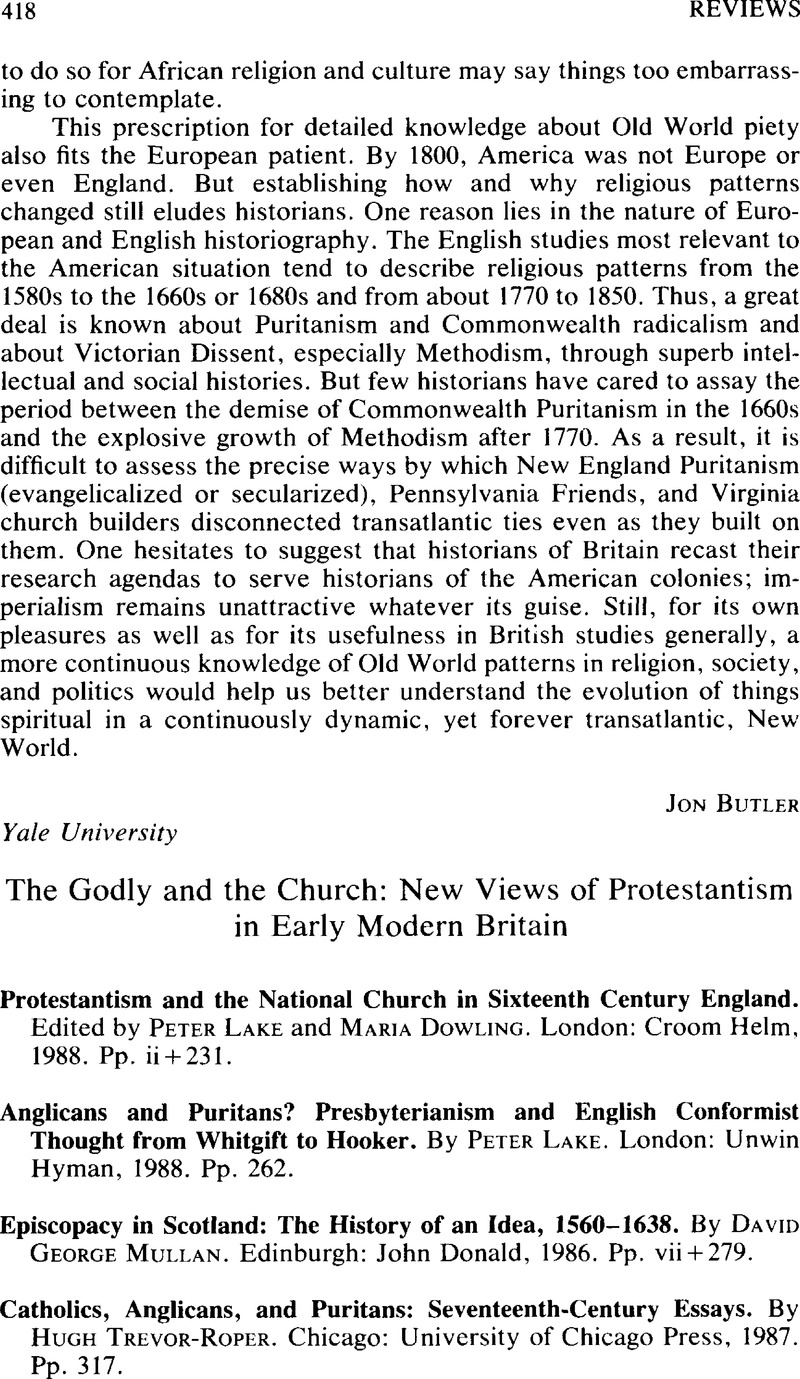Published online by Cambridge University Press: 10 January 2014

1 Dickens, A. G., The English Reformation (London, 1964)Google Scholar, and “The Early Expansion of Protestantism in England, 1520–1558,” Archiv für Reformationsgeschichte, 79 (1988): 187–222Google Scholar. Compare Scarisbrick, J. J., The Reformation and the English People (Oxford, 1984)Google Scholar; and Haigh, Christopher, ed., The English Reformation Revised (Cambridge, 1987)CrossRefGoogle Scholar, joining with his own essays those of Stephen Lander, Margaret Bowker, D. M. Palliser, and others.
2 White, Peter, “The Rise of Arminianism Reconsidered,” Past and Present, no. 101 (1983), pp. 34–54Google Scholar, reacting to Tyacke, Nicholas, “Puritanism, Arminianism and Counter-Revolution,” in Origins of the English Civil War, ed. Russell, Conrad (London, 1973), pp. 119–43CrossRefGoogle Scholar. Lamont, William responded in Tyacke, 's defense in Past and Present, no. 107 (1985), pp. 227–31Google Scholar. Tyacke, 's own response is in Past and Present, no. 115 (1987), pp. 201–16Google Scholar, with White's rejoinder in the same issue, pp. 217–29. Since then, Tyacke, 's argument has appeared fully developed in Anti-Calvinists: The Rise of English Arminianism, c. 1590–1640 (Oxford, 1987)Google Scholar.
3 Collinson, Patrick, The Religion of Protestants (Oxford, 1982)Google Scholar, and, more recently, “From Iconoclasm to Iconophobia: The Cultural Impact of the Second English Reformation,” the Stenton Lecture for 1985 (Reading: University of Reading, 1986)Google Scholar, and The Birthpangs of Protestant England (New York, 1988)Google Scholar; cf. his earlier Elizabethan Puritan Movement (Berkeley, Calif., 1967)Google Scholar. In Collinson's present court are Dent, C. M., Protestant Reformers in Elizabethan Oxford (Oxford, 1983)Google Scholar; Parker, Kenneth, The English Sabbath: A Study of Doctrine and Discipline from the Reformation to the Civil War (Cambridge, 1988)CrossRefGoogle Scholar; and Nicholas Tyacke. Lake's, PeterModerate Puritans and the Elizabethan Church (Cambridge, 1982)CrossRefGoogle Scholar articulates a mediating position between no Puritanism and the old view of puritans as radical.
4 McConica, J. K., English Humanists and Reformation Politics (Oxford, 1965)Google Scholar. Dowling charges McConica with confusing Erasmianism and protestantism, but it is a curious reading of McConica that would lead to such a conclusion.
5 Lake, Peter, Moderate Puritans, “Matthew Hutton—a Puritan Bishop?” History 64 (1979): 182–204CrossRefGoogle Scholar, “William Bradshaw, Antichrist and the Community of the Godly,” Journal of Ecclesiastical History 36 (1985): 570–80CrossRefGoogle Scholar, “Calvinism and the English Church, 1570–1635,” Past and Present, no. 114 (1987), pp. 32–76Google Scholar, and “Serving God and the Times: The Calvinist Conformity of Robert Sanderson,” Journal of British Studies 27 (1988): 81–116CrossRefGoogle Scholar.
6 Here Lake finds himself in company with an earlier Collinson, who called Puritanism “an evolved but still … primitive and fresh Protestantism …. With the Puritans we are still in the full flush of the Reformation” (Godly People [London, 1983], p. 535Google Scholar).
7 This is after the definition in Kendall, R. T., Calvin and English Calvinism to 1649 (Oxford, 1979)Google Scholar, involving a search for assurance of salvation through spiritual introspection and religious conduct within the context of the godly community.
8 On Jacobean policy, see Lake, Peter and Fincham, Kenneth, “The Ecclesiastical Policy of King James I,” Journal of British Studies 24 (1985): 169–207Google Scholar; on changes in moderate Calvinist views in this period, see Lake's “Calvinism and the English Church.”
9 Pace Donaldson, Gordon, The Scottish Reformation (Cambridge, 1960)Google Scholar, arguing the essential episcopalianism of the Reformation in Scotland.
10 Collinson, , Religion of Protestants, p. 90Google Scholar.
11 Trevor-Roper presumably refers to Erasmus's exchange with Luther on free will in drawing this connection, but why one would trace Arminius's notion of free will only so far back and not to the doctrinally more sophisticated treatments of it by Schoolmen and Fathers is unclear.
12 Fincham, Kenneth, “Prelacy and Politics: Archbishop Abbot's Defence of Protestant Orthodoxy,” Historical Research 61 (1988): 36–64CrossRefGoogle Scholar. Ward's diary is edited by Knappen, M. M. in Two Elizabethan Puritan Diaries (Gloucester, Mass., 1966)Google Scholar.
13 Morrill, J. S., “The Church in England, 1642–49,” in Reactions to the English Civil War, ed. Morrill, J. S. (London, 1983), pp. 89–109Google Scholar.